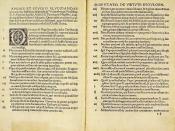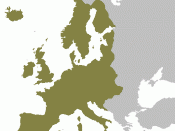In the 16th century, Germany, England, and Scotland were devastated by the ignition of the Protestant Reformation. The Reformation that was started my Martin Luther affected the power of the monarchs, the well-being of the common man and woman, and it also affected the overall balance of power in Europe.
Germany ended up being devastated by the Reformation. And because of this, the Protestant movement ultimately proved a political disaster for Germany. Charles V, the current ruler at that time, is partly to blame for the destruction of his country and the disintegration of imperial authority in it. Charles didn't understand the constitutional problems in Germany, and he really didn't care about them either. Martin Luther had started Protestantism in Germany, and it was too strong for Charles to fight back effectively. Charles was always too busy doing other things. He was constantly preoccupied with his Flemish, Spanish, Italian, and American territories.
The Turkish threat also stopped him from stopping the Protestants. Charles also couldn't keep himself out of wars. He went in war with the Valois kings of France five times between 1521 and 1555. It was the same issue each time. It was always about the Habsburg lands acquired by the marriage of Maximilian and Mary of Burgundy. It was French policy to keep the German states divided, therefore, the Catholic Kings of France supported Lutheran Princes in their challenge to defeat Charles V. Protestantism advanced the Habsburg-Valois Wars and promoted the political fragmentation of Europe (Patrouch).
Charles V wasn't the only person at fault. The German Princes were equally to blame. Roman Catholicism would mean legal confiscation of lush farmlands, rich monasteries, and wealthy shrines. Many civil authorities realized that they had a great deal to gain by embracing the new faith. Duchies, margraviates, free cities,

